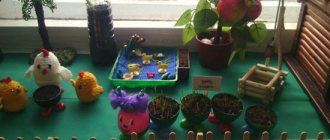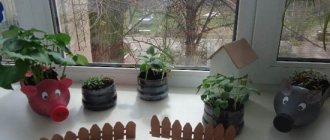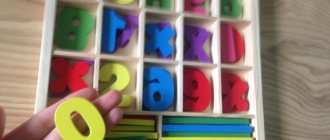The role of socially significant projects in the development of preschool education
Development of preschool education in the city of Novocherkassk
Ch. Education Department specialist
Administration of the city of Novocherkassk
Muravyova O.Yu.
The main source of financing for preschool education is and will remain in the near and distant future precisely the budget funds of municipalities. and also (to a relatively small extent) parental fees.
In connection with this topicality today, it seems to us that solving the problems of preschool education is possible using a program-targeted method, that is, through the adoption of targeted programs aimed at the development of preschool education, which make it possible to ensure the allocation of subsidies and subventions from the budgets of the constituent entities of the Russian Federation and municipal formations, as well as the possibility of attracting extrabudgetary funds.
City long-term target program
“Development of new forms of preschool education and expansion of the network of municipal preschool educational institutions in the city of Novocherkassk for 2011-2014” is aimed at providing accessible and high-quality preschool education in the city.
The main objectives of the Program are:
development of new forms of preschool education;
increasing the number of places in preschool educational institutions by optimizing the existing network;
construction of new and reconstruction of existing preschool educational institutions;
More than 10,000 children aged 0 to 6 years live in the city of Novocherkassk. More than 6,000 children attend our kindergartens. There are 3,600 people from 0 to 6 years old registered with the Department of Education for a place in the city’s kindergartens, of which 2,100 are the most needy, from 2 to 6 years old.
In one year of the program, we increased the number of places provided in kindergartens by 580 units due to the renovated premises of previously mothballed pre-school groups, the opening of short-stay groups, family groups as structural divisions of kindergartens.
In order to realize the rights of children who do not attend kindergartens in the city to equal opportunities in receiving preschool education, the Resolutions of the City Administration “On the opening of short-term groups in municipal preschool educational institutions” and “On the development of variable forms of preschool education in the city of Novocherkassk” were adopted, regulating the creation various variable conditions for obtaining preschool education.
The variable education system is represented by the following forms:
— short-term groups in 22 preschool institutions in the amount of 37 units for more than 500 places;
Groups are open at the request of parents with different areas of activity:
— for children with special educational needs;
— preschool education (today, satisfaction in preschool education for children of senior preschool age from 5 to 7 years old in our city is 96%);
- walking and weekend groups,
— adaptation groups for children and parents from 1.5 to 3 years old,
— supervision and care groups
It should be noted that no matter how many different services we provide, parents require one thing - a full day of stay and three meals a day.
There are few working mothers who are satisfied with a short day in kindergarten.
Also in our city they are ready to open
— 3 family preschool groups for 14 places
, created in the form of structural divisions of municipal budgetary preschool educational institutions of the Khotunok microdistrict, the central part of the city. This is a new form of preschool education that we encountered in 2011. Such groups are opened for children from large families and for children who did not receive a place in kindergarten.
What problems related to opening family groups concern us today?
Negative points and risks
— the organization of the work of family kindergartens, even if they are widespread, does not provide a significant increase in the enrollment of children in preschool education due to the impossibility of finding a large number of children in a residential building or apartment;
— the optional pedagogical education of the mother-educator, on the one hand, and the need to implement a general education program for preschool education, on the other hand, create a number of difficulties associated, first of all, with the organization and conduct of classes (speech development, mathematical development, etc.). This issue is resolved through a system of mentoring and the widespread involvement of specialist teachers from preschool educational institutions. At the same time, it is obvious that without course retraining (training) of a teacher who does not have a pedagogical education, the organization of qualified activities of a mother-educator in a family kindergarten is impossible;
— living conditions offered by families do not correspond to modern SanPin;
- complex and expensive procedure for undergoing medical examinations;
— payment to the kindergarten for visiting by your own child, etc.;
The expected end results of the program are a reduction in the waiting list for preschool institutions in the city by 1015 places, including through the construction and reconstruction of buildings for children's institutions.
Today we consider the conversation about public-private partnership in the field of education
exactly in this direction.
In our opinion, first of all, these are investments in the construction and reconstruction of previously mothballed or leased kindergarten buildings.
The form of effective cooperation in this direction can be called:
— a concession agreement under which educational facilities can be transferred for the construction of new or modernization of existing property (Article 4 of the Federal Law of July 6, 2005 No. 115-FZ “On Concession Agreements”;
- use of the BOLT system or “leaseback”, when on a competitive basis the investor builds an object on a municipality’s land plot at the expense of his own or borrowed funds and leases it to a person engaged in education;
Dear investors, the “Program for the Development of Preschool Education in the City of Novocherkassk” is waiting for you.
State leaders have repeatedly touched upon the development of the non-state sector in education in their speeches.
Russian President Dmitry Medvedev signed the Federal Law “On Amendments to the Law of the Russian Federation “On Education” and Article 263 of the Federal Law “On the General Principles of Organization of Legislative (Representative) and Executive Bodies of State Power of the Subjects of the Russian Federation.”
Today, the Federal Law establishes the responsibilities of the state to assist citizens in obtaining preschool education in non-state preschool educational institutions,
by ensuring the education of citizens in these educational institutions at the expense of the corresponding budgets of the budgetary
system of the Russian Federation.
Organizations of non-state preschool institutions
- this is the creation of a private kindergarten, similar to a municipal or state one, in a separate building with an adjacent territory, containing several groups of children of different ages and organizing educational activities.
In our city, such a “private kindergarten” is ready to open. However, they cannot conduct educational activities there.
In fact, this is an individual entrepreneur who rented premises from a relative, completed the building of a residential building, invested considerable funds and went quite a long way to opening his own business. Having received the OKVED code, he registered as an individual entrepreneur. Due to the lengthy process of registering property relations, it is impossible to obtain a license to conduct educational activities. Therefore, today our “private kindergarten” functions as an individual entrepreneur - a center for organizing leisure, supervision, care, etc.
What difficulties did you encounter when opening this institution?
— refusal to provide a loan due to the fact that, based on the declaration, the entrepreneur does not show profit;
— high loan rate, without taking into account the specifics of further activities;
— high rent of premises;
— large financial investments to create conditions in accordance with modern requirements of Rospotrebnadzor and Gospozhnadzor;
— lack of a license for educational activities;
And the consequence of this is the impossibility of obtaining a municipal assignment.
Today there is a legal basis for the provision of municipal orders by non-state educational institutions, but how can we help individual entrepreneurs?
Among the problems that a non-state kindergarten, as well as an individual entrepreneur, have to face is the inability to participate in government programs to support small and medium-sized businesses. These programs are designed primarily for commercial organizations, and educational activities have non-profit status.
There are also problems in obtaining long-term loans for development, repairs and construction.
Banks do not consider social facilities as attractive collateral, and they have little interest in “long-term business”, which is private education.
The state, as an interested partner, could act as a guarantor in these relationships and work out a mechanism for private kindergartens to receive long-term bank loans.
In order to improve the legislative and regulatory framework for the further development of the non-state sector in preschool education, we propose:
1) initiate in the legislative bodies the adoption of regulations establishing the abolition of taxes on profits, property, and land for non-state preschool institutions;
2) include non-state preschool institutions in the list of institutions that receive preferential tariffs for utility services;
3) establish tax incentive measures for organizations providing financial assistance to non-state preschool educational institutions;
4) pay federal compensation for part of parental fees to parents of non-state preschool institutions for maintaining a child in kindergarten;
6) provide free assistance to private entrepreneurs in organizing new kindergartens by leasing free of charge buildings (areas) on which the new kindergarten will be organized, and sharing the budget in covering the costs of repair, restoration and construction work.
Taking into account the above, we believe that the creation
favorable economic conditions will ensure the profitability of investments in the broad sense of the term (that is, in the form of the provision of financial resources, equipment, intellectual, human and other resources) in the field of preschool education by organizations and citizens;
What other forms of cooperation do we see between government and business:
- Formation of trustee or management boards. This mechanism becomes especially relevant if philanthropists and social investors put forward, as a condition for a preschool educational institution to receive long-term financing, the opportunity to participate in the formation of development programs and monitoring their implementation.
- Grant support for teachers of preschool educational institutions.
Review of ideas
For society
Cooking
The occasion for it could be the Maslenitsa holiday (pancakes are baked) or May 9 (veterans are treated to guests). You can also try doing this project in the school cafeteria so that all the necessary items for cooking are at hand.
When preparing, sanitary and hygienic rules must be observed, namely, before cooking, wash your hands with soap, put a scarf on your hair, and an apron on your clothes so that nothing unnecessary can get into the food. You should be careful with school utensils. Students must be told in advance the cooking rules, menu, and list of necessary products. It is best to assign each student to do one thing. For example, someone will bring milk, someone will bring flour, someone will bring a whisk, and so on.
REFERENCE! After finishing cooking, the room and all furniture must be put in order. Prepared food should be placed in containers or wrapped in cling film.
Help for families
Quite often a social project is implemented to help families in need. Typically, class teachers meet all the parents of their students at parent-teacher meetings. This is where you can understand which families may need help. For example, some family may have many children, and some have recently had another child, and people do not even have money for clothes for the baby. And you may have good things lying around at home that could be very useful to someone. By donating these things you will be doing a good deed.
Holiday May 9
Every year, in all schools, it is mandatory to remember the feat performed by our great-grandfathers and great-grandmothers for our sake. Usually, veterans are invited to the school, having previously prepared everything for the holiday (they decorate the room, the assembly hall, prepare refreshments, buy flowers.
For the Great Victory Day, you can combine several themes of social projects. This could be cooking, buying flowers, cleaning the school, reading poems about war, sewing suits. Of course, this will require a lot of effort, time and money, but together everything will definitely work out.
REFERENCE! Such a wonderful holiday should be made for veterans, so that they feel gratitude coming from a pure heart.
Disabled children
A social project with this name has a high level of responsibility. Typically, disabled children are educated at home or in specialized schools. Homeschooled children definitely need help. To do this, you need to ask the students’ parents if there are any disabled children around them. These children may need help learning or need to be taught how to use a computer so that in the future they can find a job online. They need help in all subjects. Students who can explain and do well should help disabled people with their studies. You can collect books that you no longer need, but will be useful to a disabled child. You need to understand that such children really lack communication with their peers, so you don’t just need to teach them, you can just talk to them about interesting topics. You need to try to become a good and loyal friend to them.
Mastery
A love of craftsmanship must be developed in children. To do this, you need to conduct labor lessons with them on a wide variety of topics in order to understand which of them has what abilities. Examples of social projects in which the help of masters is needed are: assistance to sick children, frail old people, mothers of many children. In addition, this can be sewing clothes, preparing for performances. Clothing is usually needed to raise funds for someone who needs it.
A child with talent can in the future become a real master in his field and will be able to provide for himself and his loved ones. Among other things, it is imperative to develop in children such qualities as selflessness, kindness, and hard work.
Helping another person
A social project on the topic “Help” can become quite relevant. Classmates or other people may need help. For example, successful students can help poor students improve in some subjects, but this does not mean that they need to solve their homework for them. Perhaps someone needs help purchasing textbooks. You can go together to a store where books are cheaper.
You can help outside of school. For example, students may need help with something. Some students may be good with computers, while others just need such help.
REFERENCE! Girls can start growing flowers, bringing them to someone who doesn't have any.
Helping the homeless and poor
Social projects on the topic of helping disadvantaged people (orphans, homeless, beggars) are not available in every school. Therefore, this direction is worth trying to develop. Perhaps the students will be able to save someone's life. Cooking, communication, and organizational skills will come in handy here. You can call such a social project a school of good deeds.
It is important for teachers to ensure that a distance is maintained between children and homeless people so that they do not become infected with various diseases. It is best to serve food and drinks while wearing medical gloves. You also need to go there with a first aid kit. It should contain hydrogen peroxide, brilliant green, potassium permanganate, bandages, and wound healing ointment. If a person needs more serious medical assistance, an ambulance should be called.
REFERENCE! Also, such social projects should provide assistance to those who have experienced trouble, for example, a house burned down, theft, or death of loved ones.
Gifts for children from the orphanage
As part of helping children, we can also give examples of social projects. The school director and teachers can arrange a meeting with the orphanage director to distribute gifts. If you manage to reach an agreement, then you need to discuss all the details of the upcoming meeting with the students in advance. Here you need to choose those who can devote all their free time to making gifts and creating a performance script.
A homemade item is always a good gift. Girls can look for unwanted material at home and sew toys or a bag for surprises out of it. If children have unnecessary souvenirs, books, toys, stationery at home, then all this should be donated to orphans.
Children with talents can come up with a good scenario with the help of which orphans can decide on their talents, abilities and interests. For this it would be good to come up with master classes and special games.
REFERENCE! Orphans have a specific understanding of life, so it is worth preparing thoroughly for such an event.
Significant objects
School decoration
Many children associate cleaning the school grounds with the word “subbotnik”. In essence, this is true, but such work should bring only joy. In this case, the social project for improving the school yard would be better called “School Decoration”, “Gift to Each Other”, and so on. Everything needs to be organized so that the cleanup day becomes not a day of general cleaning, but a holiday, then all the children will be happy to come to it.
First, you need to gather the whole class and discuss who can bring what to school. It could be good music, colorful buckets, interesting hats with ears. Make a cleaning plan, will there be a rearrangement, or will the walls be decorated somehow differently? Artists and designers can be given the chance to make a wall newspaper.
Cleaning up the classroom
Of course, studying in a bright, clean, comfortable room is much more pleasant. Here we are not talking about general cleaning, but about creating home comfort in the classrooms.
For example, in the classrooms of the Russian language, history, and geography, it will be enough to decorate with flowers and restore the portraits there.
Students can wash, tidy up the classrooms of mathematics, chemistry, computer science, and physics, and also put in order the instruments, instruments, and equipment available there.
Teachers can create a plan so that students know what to do. In the process of implementing the plan, you need to tell the children something new and interesting.
Social project school library
The social project about school libraries is also very popular. If desired, teachers and students can write a report on the emergence of the first libraries or how manuscripts were stored in Ancient Egypt, and much more. However, what is more important is not these stories, but your school library. The librarian and the students can conduct an audit of it, check what is available, whether everything is in its place, in accordance with the topic. Perhaps someone will bring unnecessary books and magazines from home that may be useful in the library.
REFERENCE! Such social projects must be agreed upon with the head teacher and the reading room employee. You can also make presentations on various topics or restore books.
Ecology
This topic is very important in modern society, as everyone should understand the importance of preserving nature. A social project for students on the topic “Ecology” can help in some ways here. Cleanliness must be maintained everywhere. Teachers and children can create plans for schoolyards and classrooms.
In the spring, you need to organize cleaning of the area, collect garbage, and level the ground. You can plant a wide variety of plants. The main thing is that all these activities are fun for the children.
In the school building itself, you also need to organize green corners that lift your spirits. It is important not to forget to constantly look after them. To do this, children can create a schedule for watering and other manipulations with plants.
MAGAZINE Preschooler.RF
Social and communicative development of preschool children through project activities“A child by nature is an inquisitive explorer, a discoverer of the world
So let a wonderful world open before him in living colors, bright and vibrant sounds, in a fairy tale, in a game, in his own creativity, in beauty. Through a fairy tale, a game, through unique children’s creativity - the right path to a child’s heart.”
V.A. Sukhomlinsky.
In modern conditions of social development, changes in the socio-economic sphere, culture and education, the issues of education, training and development of the younger generation are of particular importance. Today, preschool education in Russia is rightfully recognized as the initial link in the system of continuous general education.
In the Federal State Educational Standard for Preschool Education, much attention is paid to preserving the uniqueness and intrinsic value of childhood as an important stage in the overall development of a person; The emphasis is placed on the development of the child’s personality, socialization, and the disclosure of his potential capabilities and abilities.
In this regard, the main range of tasks of modern preschool educational organizations is shifting to creating conditions under which children fully develop, mastering the stage of preschool childhood, and move to the next level motivated to receive education at school. One of the priority areas of education for children of senior preschool age, which reflects the social order of society and the family, according to the Federal State Educational Standard for Education, is their social and communicative development.
Many preschoolers experience serious difficulties in communicating with others, especially with peers. Some children do not know how to address another person on their own initiative; sometimes they are even embarrassed to respond appropriately if someone addresses them. They cannot maintain and develop established contact, adequately express their sympathy and empathy, and therefore often conflict or become isolated.
A child’s mastery of culture and universal human experience is impossible without interaction and communication with other people. And a child’s ability to communicate positively allows him to live comfortably among people. Thanks to communication, he not only gets to know another person, be it an adult or a peer, but also gets to know himself more and more.
The relevance of the social and communicative development of preschool children is increasing in modern conditions due to the characteristics of the child’s social environment, in which there is often a lack of good manners, kindness, goodwill, and speech culture in relationships between people. Teachers of preschool educational organizations are concerned about changes in the moral, social and communicative development of children, and their behavior. The problem of introducing a child to the social world, developing his ability to adequately navigate an accessible social environment, realize the intrinsic value of his own personality and other people, express feelings and attitudes towards the world in accordance with the cultural traditions of society at the present stage of social development remains one of the leading ones.
What is social and communicative development? This is a complex process during which a child learns the values, traditions, culture of the society or community in which he will live.
Social and communicative development is implemented in several directions:
- Development of gaming activities
- Patriotic education
- Formation of the foundations of safe behavior in everyday life, society, and nature.
- Labor education
We would like to share our experience in integrating pedagogical initiatives to implement a program of socio-communicative development and social education of preschool children through patriotic development.
The problem of patriotic education of the younger generation is one of the most pressing today. Patriotic education of preschoolers is not only about instilling love for one’s home, kindergarten, city, native nature, the cultural heritage of one’s people, one’s nation, and a tolerant attitude towards representatives of other nationalities. But also fostering a respectful attitude towards the worker and the results of his work, his native land, defenders of the Fatherland, state symbols, state traditions and national holidays.
It is very important that children understand as early as possible that the big Motherland is Russia, the Russian Federation, it is one for everyone who was born in its vastness, who loved it, who makes efforts to make it even more beautiful, richer, and become a powerful power. And each of us needs to be able to be useful to her. And for this you need to know and be able to do a lot; From childhood, do things that would be for the benefit of your home, kindergarten, city, and in the future - for the benefit of the whole country. If a person cares about the Motherland, it means that he is its son, and that means Russia is the Motherland for him.
The child cannot organize such activities independently. An adult should help him using new modern technologies. This technology is design technology, which is based on participation in activity. The use of design technology makes it possible to develop search behavior that is relevant for a person and allows the teacher to make the first contribution to the culture of the individual: cooperation, creation, dialogue, friendship, tolerance - components of the “culture of peace” . The project method will allow you to take into account one of the main principles - the principle of integration: combining several types of activities.
In the course of joint work with children on a project, adults help introduce the child to culture: children master positive patterns of behavior in nature and society; acquire a positive and responsible attitude towards themselves, others, and nature; children receive the right to self-development.
Therefore, one of the main means of patriotic education in preschool educational institutions is the project method. Based on a personality-oriented approach to teaching and raising children of senior preschool age, he develops cognitive interest in various areas of knowledge, develops cooperation skills; opens up great opportunities in organizing joint search activities of preschoolers, teachers, and parents.
The teachers of our preschool institution developed a long-term project “Little Patriots” . The project is designed for children of senior preschool age.
Objective of the project:
- Formation of patriotic qualities of a child’s personality through introducing children to family traditions and values.
- Raising a citizen and patriot of his country, who loves his family, home, and people close to him.
- Developing the ability to work in a team and collaborate.
We worked on the project for 6 months. The project includes 4 thematic blocks.
- block – “My family”
- block – “Green Street”
- block - “I love you, city of Yekaterinburg” .
- block – “Victory Day”
Let's take a closer look.
Block 1 - “My Family”
The love of a small preschool child for the Motherland begins with the relationship with the closest people - father, mother, grandfather, grandmother. For a child, a family is a world in which the foundations of morality and attitude towards people are laid. Family members are united by blood, love, common interests, traditions, and holidays. It is in the family that such concepts as “compassion” , “mercy” , “kindness” , “masculinity” , “femininity” , “cohesion” , “unity” , “helping others” , “respect for elders” , “feeling responsibility .
To interest children in studying this topic, we held fascinating conversations and trainings on the topics: “My friendly family” , “Tell me about your family” , “ My household responsibilities” , “If mom is tired” , etc.
The children were very interested in the topic; everyone wanted to tell as much as possible about their family, and for this they, together with their parents, created video presentations and organized a photo exhibition “Our Family Vacation” .
Parents responded to all the proposed tasks related to project activities, took up the work with interest, everyone contributed interesting ideas,
Almost no family was left behind.
The children with great love made various crafts with their own hands, both from paper and from available materials: “Gift for Mom” , “Rug for the House” ; willingly sculpted, constructed from building materials and Legos, and actively took part in the “A Home for My Family” .
The final event for working on the theme “My Family” was the holiday “Inseparable Friends are My Whole Family .
Block 2 – “Green Street”
The feeling of love for one’s native nature is another component of patriotism. It is by nurturing a love for nature that one can develop the patriotic feeling of preschoolers: after all, natural phenomena and objects surrounding the child are closer to him and easier for him to perceive, and have a stronger impact on the emotional sphere. Trying to instill in children a love for all living things, we, together with our parents, carried out various forms of work, such as: the campaign “Clean up the Planet” , “A Cozy Home for the Starling” , “Animal Food” , Operation “Sprout” , within the framework of which, We were planting trees, shrubs, and flowers. We organized a “Nature Corner” We held competitions, “Best Flowerbed” , “Miracles in the Garden” , and a photo competition “Portraits of Wildlife” .
The result of the work on the “Green Street” was a generalization of our knowledge and participation in the “Ecological Path” .
Our work allowed us to expand children's knowledge about the nature of their native land, taught children to work in a team and respect each other. The children received answers to their questions and made recommendations for the residents of our city “How to preserve and decorate our planet”
Block 3 - “I love you, city of Yekaterinburg” .
Each person has his own small homeland. Most often, the favorite city is the place where a person was born and raised. To form the foundations of civic culture and social and moral development in children, it is necessary for children to acquire knowledge about their hometown.
Without sufficient knowledge, it is difficult to form in a child a respectful attitude towards the Motherland. Childhood memories are the most vivid and exciting. The more a child knows from childhood about his native places, his hometown, the closer and dearer his homeland, Russia, will become to him.
As part of this topic, together with the music director, we held conversations with children on the topic “I was born here!” , “We are proud of you, our native city ,” formed the children’s knowledge about the sights of the city, memorable places, we were able to visit some of these places. We designed a photo collage on the theme “I love you, city of Yekaterinburg .
Together with the physical education teacher, the children took part in the quest game “On the City Streets” .
A survey was conducted for parents : “Do you know your city?” , developed reminders “Famous people about love for the Motherland” , “A citizen is raised from childhood” .
We created an excursion and tourist route “Our City for Children”
The result of the work in this section was a generalization of our knowledge and participation in the musical festival “City of Miracles” .
Block 4 - “Victory Day”
Every year, fewer and fewer veterans of the Great Patriotic War remain alive. We, the current generation, are obliged to remember those who forged Victory at the fronts and worked in the rear. It is the direct responsibility of adults to help preserve the memory of the heroic facts of our history, to instill in young citizens pride in their Motherland, and to nourish the receptive soul of a child with sublime human values.
We adults have the task of expanding the social competence of children in matters of social significance of the national holiday of Victory Day within the boundaries accessible to children, emphasizing the importance of introducing preschoolers to the fact that war is always a tragedy and grief for people. At the same time, it is important for children to learn to admire the courage and heroism of the people who defended their Homeland; experience your involvement with distant events of history, feel the joy of the Great Victory, pride in your Fatherland.
This topic is loved by children. Heroism, courage, readiness to perform feats in the name of the Motherland - these traits of a Russian warrior are understandable to older preschoolers; they evoke respect and a desire to be just as courageous and brave. The project includes a number of activities aimed at the search and research activities of preschool children and the development of communication skills and abilities. We visited the “Museum of Military Equipment” in the city of Verkhnyaya Pyshma and laid flowers at the Great Patriotic War Memorial. Children and their parents are happy to take part in the “Immortal Regiment” , and I am proud to talk about veterans.
Having teamed up with other groups, in our kindergarten we organized an exhibition “Thank you for the victory,” which included photographs of the war years, military uniforms, photo albums of brothers, fathers, grandfathers, great-grandfathers who served in the armed forces of the Soviet and Russian armies, children “Victory Day” postcards .
We listen with interest to songs on military themes, they are easy to remember, their content is in tune with the desires of the children to be strong and brave defenders of our Motherland. Children and parents took an active part in the patriotic song competition “The song saved us in the trenches .
The result of the work on this section is the publication of the newspaper “We brought this day closer as best we could...” and the musical festival “Happy Victory Day!”
To summarize, I would like to note that the main task of a modern preschool educational organization is to ensure that pupils emerge from its walls not only with a certain stock of knowledge, abilities and skills, but also with a certain set of moral qualities necessary for later life, mastering social, ethical standards of behavior. It is important to develop in preschoolers the ability to build relationships with others on the basis of cooperation and mutual understanding, to ensure general mental development, to form the prerequisites for educational activities and the qualities necessary for social adaptation, including school learning.
As a result of using project activities, children became more liberated and independent, purposeful and self-confident, sociable, more attentive and caring towards peers and adults; capable of mutual understanding and cooperation.
| Next > |





